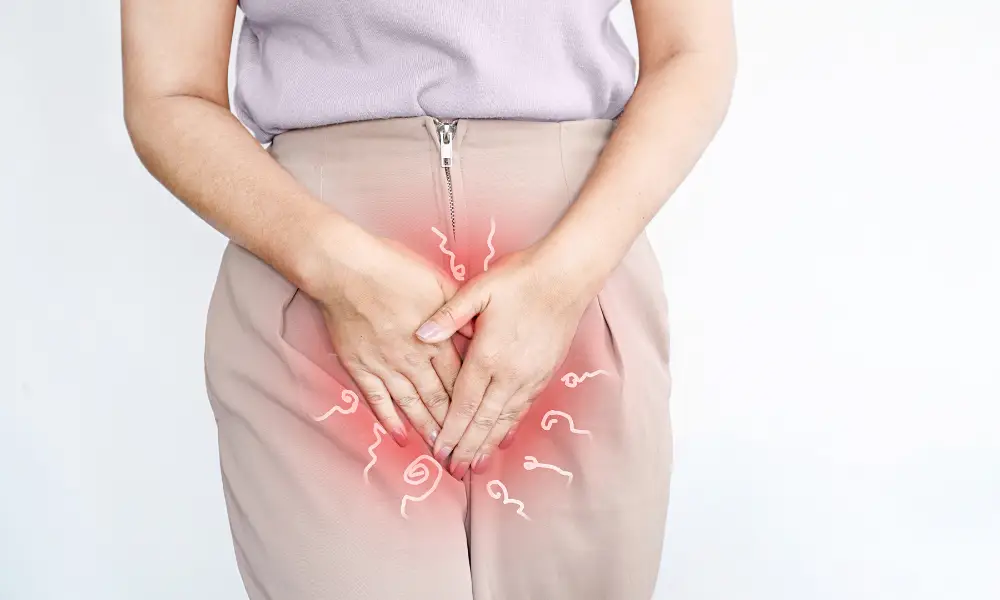Vaginal dryness is a common concern among women that often goes unaddressed. It is a common yet often overlooked concern that many women face. It refers to a condition where the vaginal tissues lack proper lubrication, leading to discomfort and potential health issues. In this article, we will talk about the complexities of vaginal dryness, its causes, symptoms, and the importance of early diagnosis.
Contents
Common Causes Of Vaginal Dryness 
Vaginal dryness can be caused by various factors, and it’s essential to identify the specific reason to address the issue effectively. Some common causes include:
- Hormonal Changes
- Menopause: A significant drop in estrogen levels during menopause can lead to thinning and drying of the vaginal tissues.
- Breastfeeding: Reduced estrogen levels while breastfeeding can also cause vaginal dryness.
- Medications
Certain medications, such as antihistamines, decongestants, and some antidepressants, can contribute to decreased vaginal lubrication. - Medical Conditions
- Sjögren’s syndrome: An autoimmune disorder that can affect the moisture-producing glands, including those in the vagina.
- Autoimmune disorders: Conditions like lupus and rheumatoid arthritis may contribute to vaginal dryness.
- Emotional Factors
- Stress and anxiety: Psychological factors can impact sexual health, leading to reduced arousal and lubrication.
- Chemotherapy and Radiation
Cancer treatments, especially chemotherapy and pelvic radiation therapy, can cause changes in hormone levels and affect vaginal moisture. - Certain Soaps and Hygiene Products
Harsh soaps, douches, and other hygiene products may disrupt the natural pH balance of the vagina, leading to dryness. - Lack of Arousal
Insufficient sexual arousal or inadequate foreplay can result in inadequate vaginal lubrication during intercourse. - Allergies or Irritants
Allergic reactions to certain materials, such as latex or spermicides, can cause irritation and dryness. - Dehydration
Inadequate hydration can affect overall bodily functions, including mucous membrane lubrication. - Smoking
Smoking has been linked to decreased blood flow to the genital area, which may contribute to vaginal dryness.
It’s important to consult with a healthcare professional if you’re experiencing persistent vaginal dryness to determine the underlying cause and explore appropriate treatment options. Treatment may involve lifestyle changes, hormone therapy, or other targeted interventions based on the specific factors contributing to dryness.
Symptoms and Impact on Daily Life
Here are some symptoms of vaginal dryness and the potential impact on daily life:
Symptoms of Vaginal Dryness
- Dryness and Itching: The most noticeable symptom is a lack of moisture in the vaginal area, leading to dry and itchy sensations.
- Pain or Discomfort during Intercourse: Insufficient lubrication can result in pain or discomfort during sexual activity.
- Burning Sensation: Some women may experience a burning sensation, especially during urination.
- Light Bleeding: Dryness can sometimes lead to irritation and light bleeding.
- Increased Urinary Frequency: Vaginal dryness can be associated with changes in the urinary tract, leading to more frequent urination.
- Recurrent Urinary Tract Infections (UTIs): The lack of protective moisture can make the vagina more susceptible to infections, including UTIs.
Impact on Daily Life
- Sexual Discomfort: Vaginal dryness can negatively impact a woman’s sexual health and intimacy, leading to decreased sexual satisfaction and potential strain on relationships.
- Emotional Impact: Discomfort and pain can contribute to emotional distress, affecting mood and overall well-being.
- Impact on Quality of Life: Persistent symptoms can disrupt daily activities and reduce the overall quality of life.
- Sleep Disturbances: Discomfort may interfere with sleep, leading to fatigue and reduced overall energy levels.
- Avoidance of Sexual Activity: Women experiencing vaginal dryness may avoid sexual activity altogether, leading to a decline in sexual satisfaction and potential strain on relationships.
- Decreased Libido: Pain or discomfort during intercourse can lead to a decrease in sexual desire.
Diagnostic Methods For Vaginal Dryness
Diagnosing the cause of vaginal dryness typically involves a thorough medical history, a physical examination, and sometimes additional tests. Here are some diagnostic methods used by healthcare professionals to identify the underlying factors contributing to vaginal dryness:
Medical History
The healthcare provider will ask about your medical history, including any symptoms, the duration of the dryness, and factors that may exacerbate or alleviate the problem. Information about menstrual cycles, pregnancies, menopausal status, and contraceptive methods can be relevant.
Physical Examination
A pelvic exam may be conducted to assess the health of the reproductive organs. The healthcare provider examines the vaginal walls, cervix, and surrounding tissues for signs of dryness, thinning, or other abnormalities.
Hormone Levels
Blood tests can measure hormone levels, particularly estrogen. Abnormal hormone levels, such as low estrogen, may be indicative of menopause or other hormonal imbalances.
Vaginal pH Test
A pH test can assess the acidity of the vagina. A higher pH may indicate a decrease in natural acidity, which can contribute to vaginal dryness.
Thyroid Function Tests
Thyroid function tests may be conducted to rule out thyroid disorders, as imbalances in thyroid hormones can affect reproductive health.
Vaginal Cultures
In cases of suspected infections, a culture of vaginal discharge may be taken to identify the presence of bacteria, yeast, or other microorganisms.
Ultrasound Imaging
Transvaginal ultrasound may be used to visualize the reproductive organs and assess the thickness of the vaginal lining.
Allergy Testing
If allergies are suspected, allergy testing may be recommended to identify potential triggers, such as latex or spermicides.
Sexual Health Assessment
Discussing sexual health, including arousal, lubrication, and any pain or discomfort during intercourse, can provide additional insights into the causes of vaginal dryness.
Psychological Evaluation
In some cases, a healthcare provider may inquire about stress, anxiety, or other emotional factors that could contribute to sexual health issues.
It’s important to communicate openly with your healthcare provider and provide detailed information to aid in an accurate diagnosis. Based on the findings, the healthcare professional can recommend appropriate treatment options to address the specific cause of vaginal dryness.
Home Remedies And Lifestyle Changes For Vaginal Care 
While severe cases of vaginal dryness may require medical intervention, there are several home remedies and lifestyle changes that may help alleviate mild to moderate symptoms. It’s important to consult with a healthcare professional before trying any new remedies, especially if you have underlying health conditions. Here are some suggestions:
- Stay Hydrated
Drink plenty of water to maintain overall hydration, which can contribute to the body’s natural lubrication. - Use a Humidifier
In dry climates, especially during winter months, using a humidifier in your bedroom can add moisture to the air and prevent dryness. - Choose Gentle Soaps
Use mild, fragrance-free soaps for intimate hygiene. Harsh soaps can disrupt the natural pH balance of the vagina and contribute to dryness. - Avoid Douching
Douching can wash away the natural protective bacteria and disrupt the vaginal ecosystem. Avoid using douches for vaginal cleaning. - Opt for Cotton Underwear
Wear breathable, cotton underwear to allow proper air circulation and minimize irritation. - Personal Lubricants
Over-the-counter water-based or silicone-based lubricants can help alleviate dryness during sexual activity. Choose products without added fragrances or irritants. - Pelvic Floor Exercises
Kegel exercises can improve blood flow to the pelvic region and enhance vaginal muscle tone. This may help with lubrication and overall vaginal health. - Healthy Diet
Consume a balanced diet rich in omega-3 fatty acids, antioxidants, and vitamin E, which can promote overall skin and mucosal health. - Regular Sexual Activity
Regular sexual activity, including self-stimulation, can help maintain vaginal elasticity and lubrication. If sexually active, communicate openly with your partner about any discomfort. - Vitamin E Suppositories
Some women find relief from vaginal dryness by using vitamin E suppositories. Consult with a healthcare professional before trying this method. - Herbal Supplements
Certain herbs, such as black cohosh and evening primrose oil, are believed to have potential benefits for menopausal symptoms, including vaginal dryness.
Conclusion
In conclusion, diagnosing and managing vaginal dryness involves understanding its causes, recognizing symptoms, and seeking appropriate medical guidance. Open communication, both with healthcare providers and within relationships, is key to addressing this common concern.
If you are facing menopause related issues, menopause treatment at HerMantra can help. Book your free trial online menopause treatment session now.




